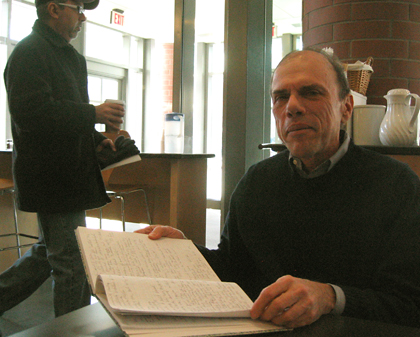
 (Photo by Ellen Gilbert)
Edward Tenner. |
While some people fall apart when their lives take an unexpected turn, others not only survive, but go on to be extraordinarily creative. Independent writer, speaker, and editor Edward Tenner believes that displacement can be a good thing, and that’s the subject of his latest book, due out in 2009.
Mr. Tenner, author of the acclaimed books Our Own Devices: The Past and Future of Body Technology (Knopf, 2003), and Why Things Bite Back: Technology and the Revenge of Unintended Consequences (Knopf, 1996), as well as a dazzling array of articles and reviews on subjects that range from the urban landscape of his native Chicago, to men’s suits, to misplaced hype about new technology, is a familiar face in the Princeton community. He received his undergraduate degree from Princeton, and returned here (“home”) after receiving his Ph.D. in history at the University of Chicago. For a number of years he was Science Editor at Princeton University Press. Now, books, articles, speaking engagements around the world, and a string of positions as a research associate or Fellow with Princeton departments ranging from Geosciences to the Woodrow Wilson International Center for Scholars, keep him preternaturally busy.
“When I start to get interested in a topic, I won’t get off the scent,” he recently observed, describing the meticulous preparation he does for the books and articles he writes on the pratfalls of new technology (there is, ironically, a “paradoxical proliferation of paper” as a result of the computer), or the unexpected consequences of how people respond to disasters; he adheres to historian William McNeil’s theory of the “conservation of catastrophe,” thus the disappointing trends in the use of antibiotics.
Mr. Tenner’s variety of interests is clearly a key to what he is all about. “I like to range a lot,” he observed. He “takes comfort in many disciplines,” and learned early on that, unlike many of his classmates at Princeton and Chicago who went on to become ultra-specialists in their respective fields, he is happiest when he is free to roam. “It’s hard to separate writing a book from other activities,” he noted. He is, he said, always “on duty,” taking “sideways glances at other things” as he travels, goes to museums, watches the international History Channel on television, reads the newspaper, or spends “whole mornings or afternoons” at the library working on his book.
A regular part of his routine these days is the daily perusal of newspaper obituaries, not for morbid reasons, but to discover lives that illustrate the thesis of the book (he prefers not to disclose the title) he is working on. There is, he noted, a probable link between his avid interest in how people turned adverse situations into wonderfully productive ones. He found himself adrift in the job-market-challenged 1970s, feeling as if he were not “particularly ‘resilient’” at the time. His success as Science Editor at Princeton University Press (including a best-selling compilation of the late physicist Richard Feynman’s work, and an award-winning book he literally cut and pasted from a misshapen manuscript) helped him to discover what he really enjoyed and did well. He is anxious to dispel the “pernicious” myth that “unless you punch your ticket in the right places” (e.g., go to all the right schools), you’re a failure.
Mr. Tenner, who enjoys swimming and hiking, described himself as being interested in “real time history.” He takes a “historian’s sensibility,” he said, and looks at what is happening. “I see trends that have not been named,” he notes, but wryly concedes that he cannot predict the outcome of the coming election, nor the future of big companies. “I’d have a big house in Princeton if I could do that.” He believes “in being hopeful” about the future, which is not, he notes, the same as being optimistic. What he is optimistic about is “people’s ability to deal creatively with adversity.”
Mr. Tenner’s web page address is www.edwardtenner.com.